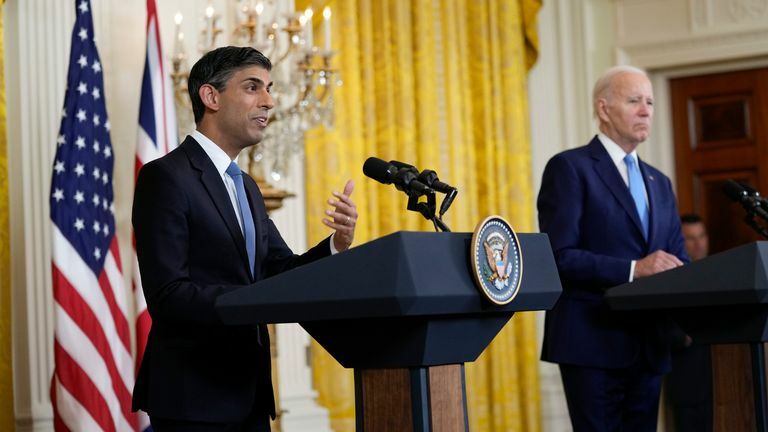UK and US unveil Atlantic Declaration to counter China’s economic threat

Rishi Sunak and Joe Biden have established a new partnership aimed at enhancing economic security in response to the growing threat posed by China. Despite not achieving a comprehensive free trade deal with the US as promised in the Tory manifesto, the prime minister and US president announced the Atlantic Declaration during a meeting at the White House. This marked Sunak’s first visit to the American presidential residence.
The agreement encompasses a narrow trade pact covering critical minerals needed for electric car batteries, closer defence industry cooperation, easing trade barriers, and a new data protection deal. The accord contains an in-principle agreement for a deal on these minerals, which are used to make various products from solar panels to electric vehicles. This would grant UK exporters access to the massive US$370bn (£294bn) green subsidies programme, the Inflation Reduction Act, introduced by President Biden to boost significant green investment in the US.
Sunak stated, “Countries like China and Russia are willing to manipulate and exploit our openness, steal our intellectual property, use technology for authoritarian ends or withdraw crucial resources like energy. They will not succeed.” He added that the partnership “protects our citizens” and includes new US investment for the UK, as he cited £14bn committed this week “creating thousands of jobs”, and highlighted “stronger supply chains” and reduced trade barriers “helping tens of thousands of small businesses”.
The prime minister mentioned that he and Biden agreed to collaborate on artificial intelligence (AI) safety, stating, “We can depend on each other with absolute conviction. When the United States and the United Kingdom stand together, the world is a safer, better, and more prosperous place and that’s why ours is the indispensable alliance.”
Biden affirmed that the US-UK economic partnership is a “source of enormous strength”. Earlier this year, the US signed a similar deal with Japan to prevent the two countries from enacting bilateral export restrictions on the minerals most critical for electric batteries, including lithium, nickel, cobalt, graphite, and manganese.
While Sunak was quick to promote the new deal, it is not the post-Brexit free trade deal that the Conservative Party pledged to deliver by the end of 2022 in its 2019 manifesto, when an agreement with the US was cited as the primary trade deal target. UK officials maintained that this new targeted approach is a more effective response to the economic challenges posed by Beijing and following Russia’s invasion of Ukraine.
However, President Biden has been open about his disinterest in negotiating a bilateral trade deal with the UK, with discussions now on hold until at least 2025. In response to questions about the government’s failure to meet this election pledge, the prime minister said the “macroeconomic situation had evolved” and insisted that the UK-US economic partnership remained strong and addressed new threats.
“Since [that pledge] we’ve had a pandemic. We’ve had a war in Ukraine and that has changed the macroeconomic situation. And the right response to that is to ensure that we’re focusing our engagement economically on the things that will make the most difference to the British people,” he said. “The real challenges we face are the threats to our economic security.”
In addition to the agreement on critical minerals, President Biden has committed to requesting Congress to approve the UK as a “domestic source” under US defence procurement laws, allowing for increased American investment in British firms. The two powers have also concentrated on enhancing the resilience of critical supply chains to exclude Russia from the global civil nuclear market. Allies are also working on semiconductor supply chains. A data protection deal will ease burdens for small firms engaged in transatlantic trade, potentially saving £92m.
Latest Thailand News
Follow The Thaiger on Google News:


























